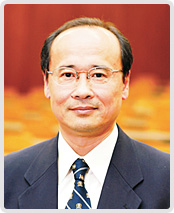
Doctor Course, Graduate School of Engineering, Tokyo Institute of Technology (1987: Coursework completed).
M.S. Graduate School of Engineering, Tokyo Institute of Technology (1984)
B.S. Faculty of Science, Tokyo Institute of Technology (1982).
E-mail:![]()
Game Theory, Mathematical Economics
Articles
“A Polynomial-Time Algorithm to Find von Neumann-Morgenstern Stable Matchings in Marriage Games”, Algorithmica, vol.58, no.1, 2010.
“Cooperative Game(Von Nuemann-Morgenstern Stable Sets)”,(joint with Shigeo Muto)In Meyers, Robert(Ed.)Encyclopedia of Complexity and Systems Science,(2009)pp 1518-1532. Springer New York.
“A note on existence and uniqueness of vNM stable sets in marriage games”, ICALP 2008 Proceedings of Workshop: Matching Under Preferences-Algorithms and Complexity,(2008), 157-168.
“On the Nonexistence of vNM Stable Sets in an Exchange Economy with Indivisible Goods,”(joint with T. Irisawa and K. Matsumoto)Discussion paper, Gakushuin University.
“Another Proof That Assignment Games Have Singleton Cores Only If Multiple Optimal Matchings Exist,” Economic Theory, vol. 29, no. 1, 2006.
“Coalition-Proof Nash Allocation in a Barter Game with Multiple Indivisible Goods,” Mathematical Social Sciences, vol. 49, no. 2, 2005.
“On House-swapping, the Strict Core, Segmentation, and Linear Programming,”(joint with Thomas Quint), Mathematics of Operation Researches, vol. 29, no. 4, 2004.
“Two Examples in a Market with Two Types of Indivisible Good,”(joint with Thomas Quint), Journal of the Operations Research Society of Japan, vol. 46, no. 1, 2003.
“On the Shapley-Scarf Economy: the Case of Multiple Types of Indivisible Goods,”(joint with Hideo Konishi and Thomas Quint), Journal of Mathematical Economics, vol. 35, no. 1, 2001.
“Coalition-Proofness of the Competitive Allocations in an Indivisible Goods Market” in Topics in Mathematical Economics and Game Theory: Essay in honor of Robert J. Aumann(Fields Institute communications vol. 23, American Math Soc.), 1999.
“Some Properties of Weak Domination in an Exchange Market with Indivisible Goods,” Japanese Economic Review, vol. 42, no. 4, December 1991.
“Strong Core and Competitive Equilibria of an Exchange Market with Indivisible Goods,” International Economic Review, vol. 32, no. 4, November 1991.
“A Note on the Strong Core of a Market with Indivisible Goods,” Journal of Mathematical Economics, vol. 13, 1984.
“A Note on the Competitive Allocations in a Market with Indivisible Goods,” Discussion Paper No. 339, The Institute of Social and Economic Research of Osaka University,1994.
Take interest in your studies while at the university. There may be times when you do not know what your interests are. If that is the case, it is actually an opportunity. By keeping a broad outlook, you may be able to narrow down your interests and study them to great depths. In order to do this, it is first necessary to rid yourselves of notions of your strengths and weaknesses. Attend all classes without bias, and always ask questions while honestly taking in the ideas from the lecture. Everyone gets irritated and impatient when they cannot keep up with lectures, but take it easy and ask your question a week later. Ask a question that includes a bit of confirmation, like "I understood this point in this way. Is this correct? But I’m not sure about the part that follows...” By doing so, you will find your own ideas and take interest in your studies.